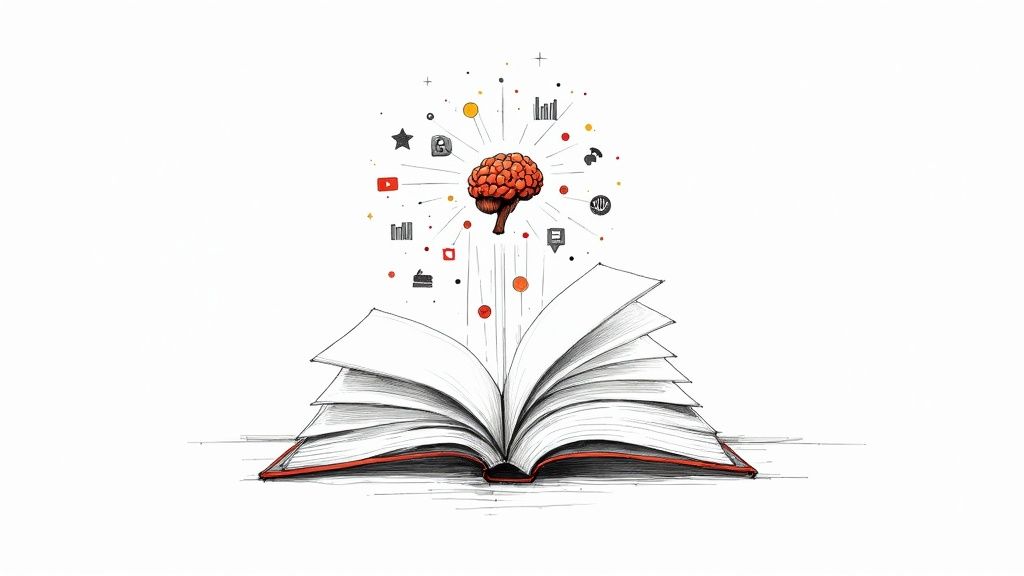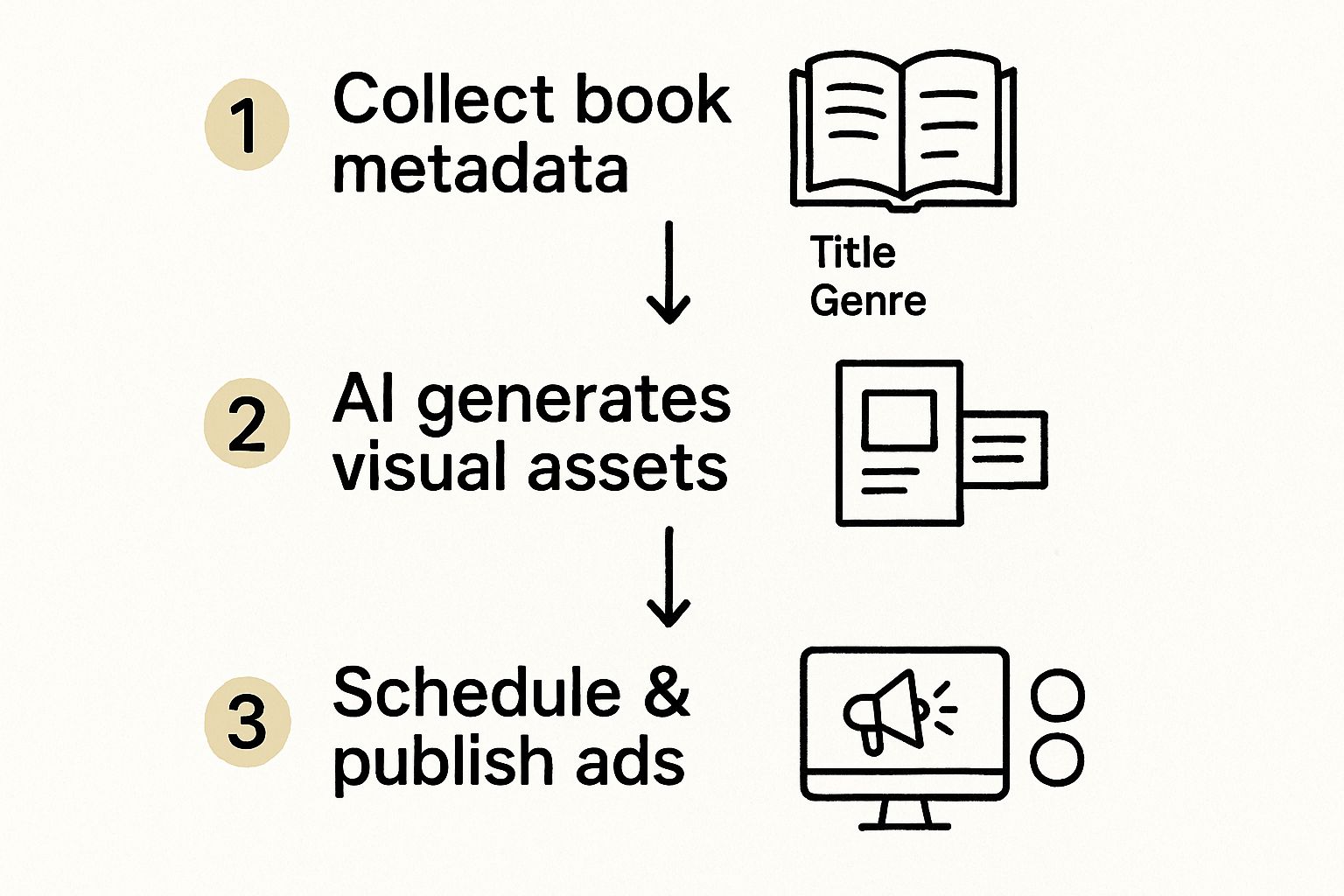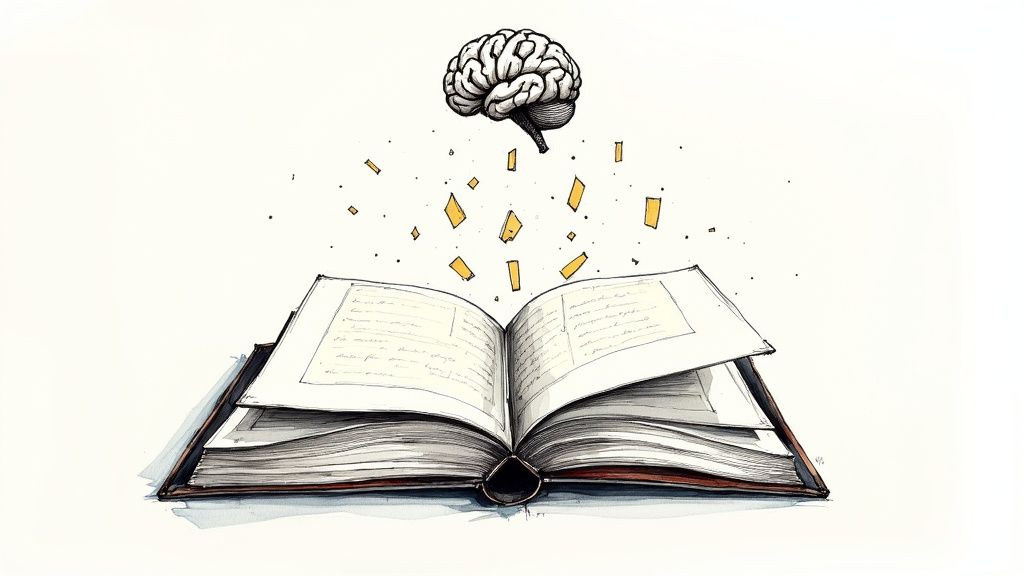How to Use AI to Market a Book: Boost Your Sales Effectively

📈 Part of Our AI Marketing Series: This article provides step-by-step marketing implementation strategies. For the complete marketing workflow covering pre-launch preparation, launch execution, and post-launch optimization, see our comprehensive Complete Guide to AI Book Marketing.
Using AI to market your book isn't about hitting a button and hoping for the best. It's about using smart tools to analyze your manuscript and instantly generate compelling marketing assets—think powerful book blurbs, laser-focused ad copy, and ready-to-go social media content. This approach turns book promotion from a time-sucking chore into a sharp, data-driven process that actually connects your story with the people who will love it.
AI Is Your New Book Marketing Co-Pilot
Welcome to the new reality of book promotion, where artificial intelligence has become your most valuable marketing partner. For as long as I can remember, authors have been stuck with a frustrating choice: either spend a fortune on a marketing agency or sink countless hours into a DIY approach that steals time and energy from writing. That’s not the world we live in anymore.
AI is leveling the playing field. It gives every author, from a first-timer on a shoestring budget to a seasoned pro, the ability to create professional-grade materials that truly resonate with readers. It's about working smarter, not harder. My goal here is to walk you through exactly how to use AI to build a complete promotional toolkit, saving you a massive amount of time and money.
Shifting from Guesswork to Data
The real magic of AI is its power to swap out marketing guesswork for solid, data-backed insights. Instead of just winging it and hoping you’ve highlighted the right themes or targeted the right audience, these tools analyze your actual manuscript to give you clear, actionable recommendations.
This isn't just a trend; it's the new standard. The AI-driven approach to book marketing is part of a much larger movement, and authors are wise to adopt these strategies for using AI in marketing that are proving so effective across other industries.
The growth here is impossible to ignore. Projections show the AI book writing market is expected to balloon from USD 2.8 billion in 2024 to an incredible USD 47.1 billion by 2034. This explosive forecast highlights just how quickly authors and publishers are embracing AI because they see the immense value it delivers.
How AI Turns Your Manuscript into Marketing Gold
So, what does this look like in practice? It’s surprisingly straightforward. A platform like ManuscriptReport.com takes your uploaded manuscript and essentially extracts its unique DNA—the core themes, essential tropes, character archetypes, plot points, and even your distinct writing style.

The image above shows just how clean that starting point is. You upload your work, and from there, the AI goes to work generating a whole suite of materials ready for you to deploy immediately.
AI doesn't just spit out generic copy. It deconstructs your unique story to build a marketing plan specifically for it, pinpointing the hooks that will grab your ideal reader and not let go.
To give you a better sense of what you'll get, here's a quick look at the kind of assets you can generate in minutes.
AI-Powered Marketing Assets at a Glance
This table provides a snapshot of the core marketing materials you can create using AI, along with their primary function and the main benefit they offer you as an author.
| AI-Generated Asset | Core Function | Key Benefit |
|---|---|---|
| Book Blurbs | To entice readers on retail sites and your book cover. | Captures reader interest instantly with proven story hooks. |
| Targeted Ad Copy | To run ads on platforms like Facebook, Amazon, or TikTok. | Reaches your ideal audience with messaging tailored to them. |
| Social Media Content | To engage followers and build an author platform. | Saves hours of content creation time with ready-to-post ideas. |
| SEO Blog Posts | To attract organic search traffic via your author website. | Establishes your authority and drives long-term discovery of your book. |
Each of these assets works together to create a cohesive and powerful marketing campaign, all derived directly from the words you’ve already written. It’s a game-changer for authors who want to focus more on writing and less on marketing guesswork.
Building Your Foundational Marketing Kit with AI
Before you dive into the exciting world of ads and social media campaigns, you need to get your core marketing assets in order. I'm talking about the absolute essentials: a magnetic book blurb, a professional author bio, and a tagline that sticks. For years, crafting these was a painful, drawn-out process of endless drafts. Now, it's the perfect place to start using AI to make your book marketing smarter, not harder.
The real secret here isn't just tossing a generic command like "write a blurb" at an AI. That's a rookie mistake. The magic happens when you feed it the right ingredients—the specific, juicy details straight from your manuscript.
Think about what makes your story unique. You need to give the AI the good stuff: the unexpected plot twists, your protagonist's raw emotional arc, and the central themes that set your book apart from everything else on the shelf. For example, don’t just say you wrote a sci-fi novel about “space travel.” Get specific. Try something like, “The main character is an exiled biologist who finds a sentient fungus on Titan. This fungus communicates through complex math, forcing her to reckon with the trauma inflicted by her mathematician father.” Now that’s a prompt an AI can work with.
From Generic to Gripping: A Blurb Case Study
Let's see this in action. Imagine an author has a new fantasy novel about a cursed knight. A vague prompt will get you a bland, forgettable result.
Initial AI Output (from a generic prompt):
"In a land of shadow and sorcery, a cursed knight must embark on a perilous quest to break his chains. He will face fearsome beasts and dark magic, but the greatest battle will be within himself. Can he find redemption before darkness consumes him completely?"
It’s… fine. But it’s also wallpaper. It could describe a hundred different fantasy books.
Now, let's give the AI something to chew on. We'll tell it the knight is cursed with empathic pain (he feels the suffering of those he harms), the villain is his former mentor, and the only cure is a mythical flower that blooms just once, during a solar eclipse.
Refined AI Output (from a specific prompt):
"For Sir Kaelen, every wound is shared. Cursed to feel the pain of any soul he harms, the kingdom's greatest champion is now a broken recluse. When his former mentor, a rogue sorcerer, unleashes a plague that feeds on suffering, Kaelen is the only one who can stop it—but each life he saves brings him closer to a death of agonizing empathy. His only hope lies in a whisper: the Sun-Petal, a flower that blooms for a single moment in the heart of enemy territory during a solar eclipse. Can he endure an army's worth of pain to reach it in time, or will the curse be his final, agonizing undoing?"
Subscribe & Get Your Free Marketing Plan Template
Receive regular updates on marketing best-practices, AI shortcuts, and get our proven 4-phase marketing roadmap for free.
Unsubscribe anytime.
See the difference? It’s night and day. The second version is crackling with high stakes, a unique magic system, and a powerful emotional hook. We got there by treating the AI not as a content machine, but as a creative partner that we guide with our story's own powerful details.
Crafting Your Author Bio and Taglines
This same principle is your best friend when it comes to author bios and taglines. Don't just say you write "thrillers." Tell the AI you write "psychological thrillers set in isolated arctic research stations that explore themes of paranoia and survival." That level of detail is what helps the AI craft a bio and taglines that will resonate with your ideal readers.
- For your bio: Give the AI your genre, core themes, and a personal detail that connects to your writing. This helps it spin up a narrative that feels genuinely you.
- For taglines: Ask for several options. You’ll want a short, punchy one for social media bios and maybe a more descriptive one for your website banner.
This infographic shows how you can take that core book data and spin it out into a whole suite of marketing assets, both text and visual, ready for different platforms.

Once you have these foundational pieces, AI tools can rapidly adapt them into different visual formats. It dramatically shortens the path from a finished manuscript to a full-fledged marketing campaign. Nailing this kit is a critical first step, and if you’re trying to keep costs down, you can find more tips in these 7 essential steps for an affordable book launch.
By combining the raw power of AI with your unique authorial vision, you can build a marketing foundation that’s not just effective, but truly represents the heart of your work.
Crafting High-Converting Ad and Social Media Copy
Alright, you've got your foundational marketing kit sorted. Now for the fun part: feeding the content beasts we call online advertising and social media. Keeping up with that relentless demand for fresh, engaging copy is a massive challenge for any author. This is where AI really starts to work for you, helping you market your book not just effectively, but tirelessly.
Think of AI as your dedicated marketing assistant—one that never gets tired, never runs out of ideas, and works around the clock. It’s the key to moving from a finished manuscript to a multi-platform content plan that actually drives sales, all without eating up every second of your day. The goal here is to generate a ton of quality, targeted content that you can then polish and schedule, freeing you up to do what you do best: write your next book.

Generating Targeted Ad Copy for Every Platform
Running ads on platforms like Facebook, Instagram, or Amazon is a fantastic way to reach new readers, but it demands a very specific kind of writing. Each platform has its own unwritten rules, character limits, and audience expectations. Luckily, AI is incredibly good at spinning up variations tailored to each one.
The secret is giving the AI the right context. Don't just make a vague request; get granular with your prompts.
Here’s a real-world example of how I’d structure a prompt to get great, platform-specific results:
Example AI Prompt for Facebook Ad Copy: "I need three Facebook ad variations for my sci-fi thriller, '[Your Book Title].' The target audience is fans of The Martian and Project Hail Mary. The copy should be under 150 words and focus on the book's core hook: a lone astronaut who discovers a cryptic alien signal that seems to predict the end of humanity. End with a strong call to action like 'Discover the truth before it's too late. Download on Kindle today!'"
This prompt gives the AI everything it needs to succeed: the platform, book title, comp titles to define the audience, word count, the core hook, and a clear call to action. From this, the AI can spit out several distinct ads you can then A/B test to see which one really connects with readers.
Customizing Ads for Different Reader Profiles
Your book doesn’t just have one type of reader. A fantasy epic might draw in people who love intricate world-building, but it could also attract readers who are there for the slow-burn romance subplot. You need to market to both groups, and your messaging should be different for each.
This is another area where AI shines. When you feed your manuscript into a tool like ManuscriptReport.com, the AI can actually identify these different reader profiles and help you craft ads that speak directly to what they love.
For example, you could ask the AI for:
- An action-focused ad: Highlighting the epic battles and high-stakes political intrigue.
- A romance-focused ad: Centering on the emotional journey of the main couple and the obstacles they face.
- A world-building ad: Teasing the unique magic system, ancient lore, and fascinating cultures of your world.
This level of audience segmentation used to require seriously expensive market research. Now, AI makes it accessible. In fact, some marketing consultants used to charge upwards of $30,000 for this kind of detailed reader persona work. Today, authors can get similar insights for just $10 to $20 a month from AI tools that create these segments by analyzing the book itself. You can learn more about how AI is changing the game for author promotion on Author Media.
Building a Full Month of Social Media Content
Let’s be honest: the social media treadmill is exhausting. Trying to come up with a month’s worth of posts can lead to serious burnout. But what if you could generate an entire content calendar in minutes, based on the material already in your book?
Pro Tip: Don’t just ask for "social media posts." Ask for a variety of post types. A good prompt will request a mix of formats to keep your feed from getting stale.
Here’s a sample prompt to generate a week’s worth of varied, engaging content:
- Monday: An engaging question for my followers related to the theme of betrayal in my novel.
- Tuesday: A "two truths and a lie" post about one of my main characters, [Character Name].
- Wednesday: A visually descriptive quote from Chapter 5, perfect for a Canva graphic.
- Thursday: A behind-the-scenes fact about my research for the book's setting in ancient Rome.
- Friday: A direct call-to-action post with a link to buy the book, using a hook about the cliffhanger ending.
Some platforms, like ManuscriptReport.com, take this even further. Their tool can extract around 30 ready-to-use social media posts—complete with relevant image suggestions—directly from your manuscript. This kind of automation is a lifesaver, turning what used to be a week-long headache into a ten-minute task.
By blending the efficiency of AI with your own unique author voice for the final polish, you create a powerful, sustainable marketing engine that sells books while you get back to writing the next one.
An author platform isn't just about selling your latest book; it's about building a career. It's the place where readers can find you, fall in love with your work, and stick around for whatever you write next. For a long time, building that platform with content—especially blog posts that show up on Google—has been an absolute grind.
This is where AI can change the game, helping you market your book in a way that builds something that lasts.
Instead of just guessing what your readers might want to read, AI tools let you find out what they're actively searching for. This is the heart of Search Engine Optimization (SEO), and it’s no longer some dark art only for tech wizards.
Finding Out What Your Readers Really Want
To build a platform that connects, you first need to understand your audience's curiosity. What questions are they asking that your book, or the world you’ve built, can answer? This is where keyword research comes in, and AI can do the heavy lifting by sifting through search data to find the exact phrases your ideal readers are typing into Google.
Let’s say you write epic fantasy. Your research needs to go deeper than just "fantasy books." An AI can dig in and show you that people are actually looking for things like:
- "Best magic systems in epic fantasy"
- "History of dragon lore in mythology"
- "Political intrigue in fantasy novels"
These aren't just search terms; they're blueprints for your content. Each one is a direct line to a potential fan who is already interested in the themes you’re passionate about. It takes the guesswork out of blogging and ensures you’re creating articles people are actually trying to find.
The real magic of SEO is that it shifts you from short-term tactics to a long-term strategy. An ad buy is great, but it disappears the second you stop paying. A blog post that ranks well can bring new readers to your website for years to come—for free.
From Keywords to a Solid Content Plan
Once you have your target keywords, you face the next challenge: turning them into an actual article. We’ve all been there, staring at a blank page. You can use an AI as a brilliant structural editor to map out a blog post that's engaging for humans and structured for search engines.
Back to our fantasy author. They decide to target "Political intrigue in fantasy novels." They could feed an AI a prompt like this:
"Create a detailed blog post outline for the keyword 'Political intrigue in fantasy novels.' The audience loves books like A Game of Thrones and The Priory of the Orange Tree. Make sure the outline includes a hook for the intro, sections on common tropes like royal succession and spy networks, and a conclusion that recommends my book, '[Your Book Title],' as a great read for fans of political fantasy."
What you get back is a structured outline, complete with headings, key points for each section, and smart ideas for weaving your book in without it feeling forced. It handles the organizational grunt work, so you can dive into what you do best: the writing.
Drafting an Article That Sounds Like You
With a solid outline ready, you can have the AI generate a first draft. I know, this is where many authors get nervous, worried it will sound robotic. The trick is to see the AI's output not as the final piece, but as the raw clay.
Now it's your turn to shape it.
- Add your personal stories: Did a specific historical event inspire a political plot in your novel? Tell that story. It’s a detail no one else has.
- Inject your voice: Rewrite sentences to match your unique style. Are you witty and informal, or more academic and serious? Make it sound like you.
- Correct the nuances: An AI might get the facts right but miss the subtle emotional context. Your job as the author is to add that human layer back in.
This kind of partnership is incredibly effective. It’s no surprise that over 80% of marketers are already using AI in their online work. Authors can finally tap into tools that were once too complex or expensive. If you’re curious about the data, WebFX has some great insights on AI marketing statistics.
If you really want to get a handle on this, learning how to use AI for SEO can give your author platform a serious boost.
The final article will be optimized for search, packed with info your readers want, and—most importantly—it will sound like you. When you consistently publish this kind of valuable content, you’re not just promoting a book; you’re establishing yourself as an expert in your niche. You’re building an author platform that attracts readers organically and builds a foundation for a long-term career.
Beyond the Launch: Advanced AI Strategies for Long-Term Book Sales

The book launch is a sprint, but building an author career is a marathon. It's exhilarating to see those initial sales, but the real work begins when the launch-week buzz quiets down. How do you keep the momentum going? This is where AI shifts from a launch-day helper to a long-term strategic partner.
Your early reader reviews are an absolute goldmine. I'm not just talking about skimming them for a quick ego boost (or a gut punch—we've all been there). You can actually feed dozens of reviews into an AI tool to perform sentiment analysis. This gives you a high-level view of what truly resonates with your audience. The AI can pinpoint recurring themes, highlight the side characters people can't stop talking about, and identify the plot twists that got the biggest reactions.
This isn't just interesting data; it's pure marketing fuel. If the analysis reveals readers are obsessed with your sarcastic wizard, you know exactly who to feature in your next round of Facebook ads. It allows you to stop guessing and start sharpening your marketing messages based on what already works.
Creating Irresistible Lead Magnets with AI
Every author knows an email list is crucial. It’s your direct line to your biggest fans. But getting readers to hand over their email address requires a compelling reason, and this is where AI can be a game-changer. A "lead magnet"—that free goodie you offer for a signup—is your best tool for the job.
Instead of spending weeks writing something from scratch, you can use AI to quickly generate ideas and even draft entire lead magnets using your book as the source material.
- Prequel Short Story: Give the AI the backstory of a key character and prompt it to draft a 5,000-word short story exploring their origins before the main plot.
- Character Guide: Have the AI pull descriptions, key scenes, and motivations for every major character, compiling it all into a "superfan" guide.
- Deleted Scenes: Got a few scenes that hit the cutting room floor? An AI can help polish them and weave them into a cohesive collection of "bonus content."
What used to be a daunting writing project can become an afternoon task. The AI does the heavy lifting on the initial draft, freeing you up to do the fun part: infusing it with your unique authorial voice.
A powerful lead magnet does more than just grow your list; it deepens the reader's connection to your world. By giving them a free, high-value story or guide, you're turning a casual reader into a dedicated fan who can't wait for your next release.
Turn Your Book into an Endless Content Engine
Your book isn’t a one-and-done product. It’s a deep well of content you can draw from again and again to keep your audience engaged between releases. Think of it as the core of your content strategy. AI can be your tireless assistant in this process, helping you spin your manuscript into countless other formats.
Imagine taking just one chapter from your book and atomizing it. For a nonfiction author who wrote a book on productivity, you could task an AI with a few things:
- Generate a Video Script: "Turn this chapter into a script for a 5-minute YouTube video, including visual cues and a call to action."
- Outline a Webinar: "Create a 30-minute webinar outline from this chapter, expanding on the key ideas and suggesting interactive poll questions."
- Draft a Mini-Course: "Break this chapter into a five-part email mini-course, with one key lesson delivered each day."
This strategy lets you show up on different platforms and reach new audiences without constantly having to invent brand-new material. It’s a powerful model that many authors are using to grow their platforms, and you can learn more about how specific AI-driven tactics to boost book marketing in our detailed guide.
By analyzing reader feedback, creating high-value lead magnets, and repurposing your core content, you're building a sustainable marketing system. This isn't just about selling one book; it's about building a loyal fanbase that will stick with you for your entire career.
Common Questions About AI for Book Marketing
When authors first consider using AI for book marketing, a lot of questions—and a fair bit of skepticism—tend to surface. I get it. It feels like a big leap, and it's smart to be cautious. Let's tackle some of the most common concerns I hear from authors just like you.
My goal here is to cut through the noise. Using AI isn't about letting a machine take over your author brand. It’s about adding a powerful, efficient assistant to your team so you can reach more of the right readers.
Will AI Make My Marketing Sound Robotic?
This is the big one, isn't it? It's the number one fear, and for good reason. You've poured your soul into your book, and the last thing you want is for it to be promoted with soulless, cookie-cutter ad copy.
The secret is to change how you think about the tool. AI is your collaborator, not your replacement.
The quality of what you get out is a direct reflection of what you put in. Vague prompts lead to vague, generic content. But when you give the AI specific details—your book's unique voice, its core emotional hooks, the quirks of your main character—the output becomes surprisingly insightful and personalized.
Think of it like a brilliant but junior copywriter. It can generate a solid first draft in seconds, handling the structure and basic ideas. That frees you up for the most important job: refining, editing, and injecting your unique authorial flair. It gives you clay, and you're still the sculptor.
Is It Expensive to Use AI Marketing Tools?
Not anymore. In fact, one of the best things about bringing AI into your marketing workflow is how accessible it has become. Hiring a freelance copywriter or a marketing agency can cost thousands of dollars, which is a non-starter for most independent authors.
AI flips that script. It gives you access to high-level marketing strategy without the high-level price tag. Many of the best platforms are built on affordable subscription models.
- You can find powerful tools with fantastic features for as little as $10-$20 per month.
- Services like ManuscriptReport.com offer a deep-dive analysis and generate a comprehensive marketing kit for a single, one-time fee that's a tiny fraction of a consultant's project rate.
This levels the playing field, empowering authors on a budget to create marketing assets that can compete with those from major publishing houses.
How Much Technical Skill Do I Need?
Honestly, you probably have all the skills you need right now. If you can type an email or update your Facebook status, you can use these tools. Modern AI platforms are designed for regular people, not programmers, with clean layouts and intuitive controls.
The process is usually as simple as typing a clear instruction—what we call a "prompt"—into a text box. The real art isn't technical; it's learning to write effective prompts that give the AI the right context and direction. This whole guide is packed with examples to get you comfortable with that, so you can dive in with confidence.
Can AI Find the Right Audience for My Niche Book?
Absolutely. In fact, this is where AI really shines. When a tool can analyze your entire manuscript, it sees beyond the obvious genre. It picks up on the subtle sub-genres, tropes, and thematic threads that appeal to very specific reader communities.
It can build detailed reader personas and point you toward niche audiences you might never have thought of. Maybe it will analyze your epic fantasy and discover its strong "found family" trope would be a huge draw for a specific online book club. If you want more general advice on finding your readers, our guide on how to market a book is a great place to start.
This kind of data-driven targeting helps you stop shouting into the void and start speaking directly to the people who are waiting for a book just like yours.
Ready to see what AI can do for your book? With ManuscriptReport.com, you can generate a complete marketing kit—from blurbs and ad copy to social media posts—in about 10 minutes. Stop guessing and start marketing with data-driven confidence. Get your report today!
Enjoyed this article? Subscribe for more + get a free marketing roadmap template.
Receive regular updates on marketing best-practices, AI shortcuts, and get our proven 4-phase marketing roadmap template for free.
Unsubscribe anytime.
Related Articles

6 Essential Book Marketing Strategies for Romance Novels
Discover 6 proven strategies to market your romance novel effectively and boost sales.

7 Budget-Friendly Book Marketing Strategies: Complete Guide for Indie Authors
Master budget book marketing with 7 proven strategies that work on $0-$500 budgets. Real ROI data, free tools, and actionable tactics for indie authors.

7 Essential Book Giveaway Strategies to Build Loyalty
Discover 7 essential book giveaway strategies to boost reader loyalty and engagement.